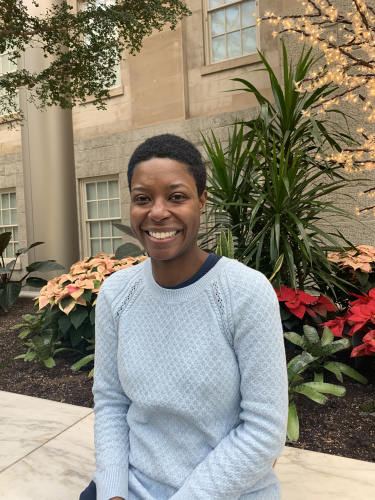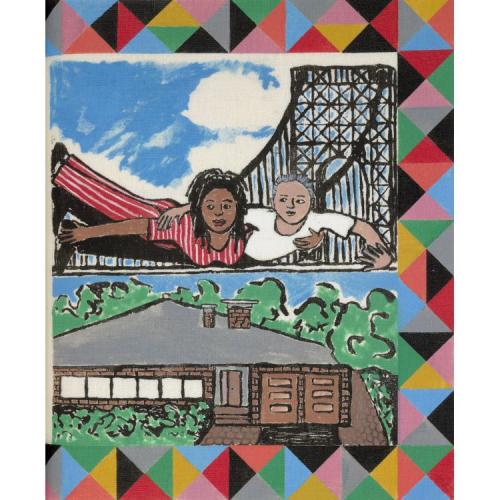
Ashleigh D. Coren in the Kogod Courtyard at the National Portrait Gallery and the Smithsonian American Art Museum. Photo by Elizabeth Dale-Deines.
Ashleigh D. Coren works as the women's history content and interpretation curator at our National Portrait Gallery. She works with the public as well as behind the scenes to connect audiences with the stories of incredible women they've never heard about before.
What kinds of projects do you work on as a content and interpretation curator?
My days vary depending on what's happening in the museum and what's happening with the Smithsonian American Women's History Initiative. Some days I do a lot of historiographic research on the history of women in portraiture to learn more about the National Portrait Gallery's collections, going through primary sources like old newspapers. Some days I prepare for teacher workshops and webinars. Some days I work with artists and other scholars to develop panels for our museum programming.
Not many people work on research, education, and programming. By doing work directly with visitors and educators—plus my work behind the scenes—I get to learn different things to share with all three of my teams.
Why is your work vital for the Smithsonian?
There's so much women's history that I get to share with our audiences. I get to show folks, "Here's how you discover these people from all walks of life and races and here's why they matter." It's so important to educate the public about women's contributions to history that may be overlooked. It's important to preserve these stories and explore why these stories are missing.
One of the unique things about my job is that I get to talk to people about both art and history. I get to focus on stories our portraits tell about what it means to be an American and what it has meant to be an American in the past.
Was there a moment in your life that changed how you thought about women's history?
In college I learned more about the work of Faith Ringgold, a writer and artist. It was refreshing to see a woman who uses art to share the hidden histories of African Americans in this country. Ringgold understands that history isn't just about notable women, it's about women we know—our mothers, our aunts, the women who live down the street. That's women's history. Commemorating women who may never get a portrait in a museum. That was really powerful to me.

"Faith and Burdette Ringgold." National Portrait Gallery, Smithsonian Institution © Faith Ringgold/Artists Rights Society (ARS), New York
How did you learn about women's history as a student? What would you say to a student interested in learning more about women's history?
I learned about women's history in school, but a lot of it was from my family and from reading historical fiction books. My mom talked about activist and abolitionist Harriet Tubman, politician Shirley Chisolm, and poet Phillis Wheatley. I'm from Boston, so Phillis Wheatley came up a lot [because she spent most of her life in Massachusetts].
I think some people have this idea that books are the only way of getting information. You can learn about women through movies, TV shows, speeches, blog posts, and portraiture! My advice would be open yourself to different ways of learning about women. Wikipedia can also be a great place to start for getting those initial questions answered.
What's one project you're excited to be working on right now?
One project I'm excited about is working with Open Knowledge Coordinator Kelly Doyle to add National Portrait Gallery images of women to Wikimedia Commons. I am currently exploring the collection to see if there are gems that can help share women's history on Wikipedia. Last year Kelly, along with volunteers, uploaded images of women from the National Portrait Gallery's collection to Wiki Commons. Our Sojourner Truth portrait [depicting the abolitionist and human rights activist] was incredibly popular with hundreds of thousands of views. That proves to me that there's a clear need for people to see women of color. It's up to us to fill that need.
The Smithsonian American Women's History Initiative, Because of Her Story, funds curators to research and share women's history at museums and centers across the Smithsonian. To support more women's history research, you can sign up for our newsletter to stay in touch. You can also donate to the Smithsonian American Women's History Initiative.